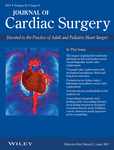Tricuspid valve replacement with mechanical prostheses: Short and long-term outcomes
Abstract
Background and Aim
Tricuspid valve replacement has been associated with high mortality and poor long-term outcomes. We report the preoperative risk factors associated with short and long-term outcomes following tricuspid valve replacement with mechanical prostheses.
Methods
In 62 patients who underwent mechanical tricuspid valve replacement, clinical, laboratory, and echocardiographic findings were analyzed using both univariate and multivariate analyses to describe operative and long-term mortality.
Results
In our population (mean age 59 ± 9.7 years, 82.3% female), most common causes of tricuspid valve disease were rheumatic fever (69.4%) and functional regurgitation (19.4%). Operative and long-term mortality were 17.7 and 33.9%, respectively. Age, diabetes mellitus, and coronary artery disease were independently associated with increased long-term mortality. New York Heart Association (NYHA) class and right heart failure symptoms significantly improved during follow-up.
Conclusions
In this series of mechanical tricuspid valve replacements in patients with predominately rheumatic heart disease, operative and long-term mortality were increased; however, survivors had significant improvement in their NYHA class and freedom from right heart failure symptoms. Three preoperative factors (age, diabetes mellitus, and coronary artery disease) were independently associated with long-term mortality.




